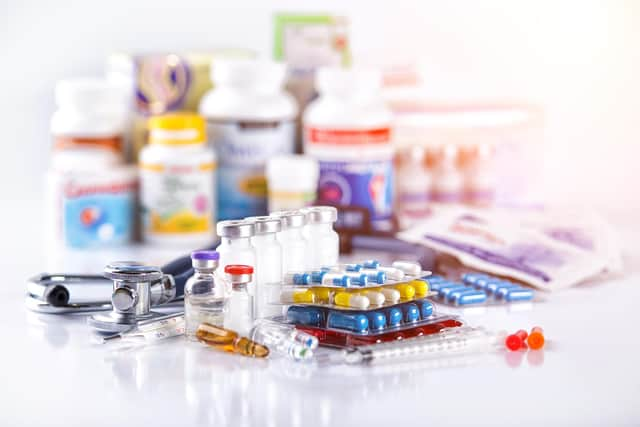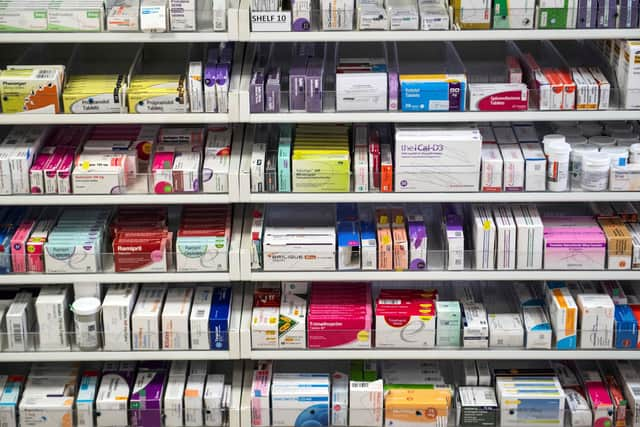Social media sites used as 'black market' to 'swap' drugs by patients in Scotland who cannot get medications on NHS
Some NHS patients say they are being forced to use the drugs black market to obtain medication via social media sites, an investigation by The Scotsman has revealed.
Patients who are refused prescription for anxiety and pain medications like diazepam and tramadol due to their potential to cause addiction are able to 'swap' legal prescriptions with drug dealers via an illegal black market advertised on social media.
Advertisement
Hide AdAdvertisement
Hide AdThese medications are then sold on, often via messaging apps WhatsApp and Telegram, after first being advertised on social networks such as Snapchat and Instagram.


Telegram channels – a type of chat room – seen by The Scotsman advertise drugs for delivery in every major city in Scotland. Although these channels frequently sell illicit drugs such as cocaine and heroin, they also sell controlled medicines.
A man from the Central Belt of Scotland, who spoke to The Scotsman on condition of anonymity, said he used drug swaps to treat his medical condition and allow himself to care for his family.
“I've got a chronic disease, and it's quite debilitating,” he said. “The treatment the doctors have prescribed keeps failing, and I'm in a lot of pain. They’ve prescribed me pain medication that doesn’t help.
“The prescribed medication doesn't help, so I source medication from the black market.”


The man said he swaps his prescription for medication the drug dealers have, but also purchases some quantities outright. Without the black market medication, he said he “wouldn’t be able to walk ten minutes down the road and wouldn’t be able to function”.
“It’s legit stuff you get,” he said. “It’s not counterfeit or anything like that – counterfeit stuff goes to heroin addicts. They’ll get their methadone in the morning, then go and buy heroin and cheap street valium.”
This poly-drug use is implicated in many of Scotland’s drug deaths.
Advertisement
Hide AdAdvertisement
Hide AdPublic Health Scotland’s ‘Surveillance Study in Illicit Substance Toxicity’ (ASSIST), tested 100 emergency drug attendances at Glasgow’s Queen Elizabeth University Hospital between February and May last year.
The study found a trend towards poly-drug use, with many patients having more than one drug present in their system. The most popular type of drug to pair with other substances is benzodiazepines, like diazepam and elicit ‘street’ versions such as etizolam. Benzodiazepines made up 51 per cent of all drug detections in the study.
The man from the Central Belt claimed his use was far removed from that of heroin addicts. If his chronic condition is having a flare-up, he explained, he just types his location and the drug he wishes to buy into social media sites and finds dealers. They are then contacted via messaging services like WhatsApp or Telegram to arrange a meeting.
“I probably spend a couple hundred pounds a month, but without it, I wouldn’t be able to work, so it’s like an investment,” he said.
Despite the risks, he said he was “very careful” to avoid addiction, and limited the number of tablets to guidelines issued by the NHS.
“Some of the people selling legit meds are decent people,” he said. “It’s not just addicts and junkies going to them, it’s business people and teachers.”
Some dealers will even test the medications to advertise their purity to users, he said.
Diazepam, a drug used to control anxiety, is one of the most commonly available black market medications.
Advertisement
Hide AdAdvertisement
Hide AdIt is even available in different varieties according to which legitimate manufacturer it purportedly originated from, such as Crescent Pharma, Accord Healthcare and Teva Pharmaceuticals. Boxes from these manufacturers are advertised for around £35 for 5mg tablets, and £45 for 10mg.
“Short-term use of diazepam is recommended,” said Laura Wilson, the Scotland director of the Royal Pharmaceutical Society.
“The drug’s abuse potential, the fact alternative medications are more preferable and obviously the addiction potential means only short-term use is recommended.”
The “short-term reward” is that it can help anxiety in the short term, Ms Wilson said, but in the longer term doctors “want to get to the bottom of what is actually causing their problems” via non-pharmaceutical interventions.
Pregablin, a medication used to treat seizures and nerve pain, but which has a high street value due to the effects it produces in conjunction with illicit drugs, is available in boxes of 150 pills.
Tramadol, the powerful opioid painkiller, is advertised for £80 per ten trays of tablets.
The sleeping medication Zopiclone is available in 10mg tablets for £15 per tray. The origin of some of the drugs appears to be foreign, as Zopiclone is generally available in the UK in 3.5mg and 7mg tablets, while American drugs such as Xanax – infamous for its popularity in the US rap scene – are listed for sale.
Buying foreign drugs is not without risk, Ms Wilson said.
“In the UK, we licence drugs according to how they're manufactured, the quality control that they're put under, the guarantee of strength, and the guarantee of what's in the tablet,” she said. “All that is taken into consideration and then a drug will be given a product licence, which means it can be supplied in the UK.”
Advertisement
Hide AdAdvertisement
Hide AdMs Wilson added: “When you are bringing things in from other countries, unless you know exactly where that came from, and what country originated from, then that [stringent checks] can't be guaranteed.”
Dr Chris Williams, deputy chair of the Royal College of GPs Scotland, said the college was “concerned” about the prospect of patients swapping prescription medications, “especially where these would be used in unintended ways, with the risk of potentially dangerous interactions”.
"GPs prescribe when we have adequate knowledge of our patient's health and are satisfied that the drugs serve that individual's needs,” he said. “GPs are able to consider the whole person, balancing multiple robust clinical factors within the frame of an individual's priorities and circumstances.
“It can potentially be highly dangerous for an individual to consume a drug which they themself have not been prescribed.”
Police Scotland told The Scotsman it was a matter for Public Health Scotland.
Meta, the parent group of Facebook, Instagram and WhatsApp, was contacted for comment. The company’s policy on restricted goods and services states it is against Meta’s rules for people to buy, sell, trade, donate or solicit drugs on its platforms.
Meta has said it took action on 1.8 million pieces of drugs-related content on Facebook – more than 97 per cent of which it said it found before posts were reported – between July and September last year.